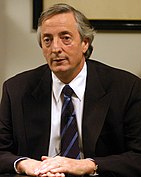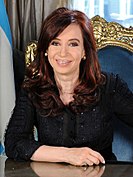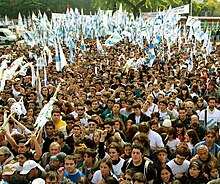Kirchnerism
This article needs to beupdated.(June 2016) |
Kirchnerism Kirchnerismo | |
|---|---|
  Néstor Kirchner(left) andCristina Fernández de Kirchner(right) served as Presidents of Argentina from 2003–2007 and 2007–2015, respectively. | |
| Leader | Cristina Fernández de Kirchner |
| Founder | Néstor Kirchner |
| Founded | 1 March 2003 |
| Headquarters | Buenos Aires |
| Youth wing | The Campora |
| Membership | Justicialist Party |
| Ideology | Peronism[1][2][3][4] Neo-developmentalism[5][6][7][8] Transversalism[9][10][11][12][13][14] Anti-neoliberalism[15][14][16][17][18] Social democracy[1][2][3][19][20] Left-wing populism[21][22][23][24] Progressivism[25][26][27][3][28] Economic nationalism[29][30][31][32] |
| Political position | Centre-left[40]toleft-wing[46] |
| National affiliation | Front for Victory(2003-2017) Citizen's Unity(2017-2019) Frente de Todos(2019-2023) Union for the Homeland (since 2023) |
| Seats in theChamber of Deputies | 90 / 257
|
| Seats in theSenate | 32 / 72
|
| Website | |
| www | |
| Part ofa serieson |
| Progressivism |
|---|
Kirchnerism(Spanish:Kirchnerismo[kiɾʃneˈɾismo]) is an Argentine political movement based onpopulistideals formed by the supporters of spousesNéstor KirchnerandCristina Fernández de Kirchner,who consecutively served asPresidents of Argentina.Although considered a branch ofPeronism,it is opposed bysome factions of Peronistsand generally considered to fall into the category ofleft-wing populism.[28][47][48]
Although originally a section in theJusticialist Party,Kirchnerism later received support from other smallerArgentine political parties(like theCommunist Partyor theHumanist Party) and from factions of some traditional parties (like theRadical Civic Unionand theSocialist Party). In parties which are divided along Kirchnerist/Anti-Kirchnerist lines, the members of the Kirchnerist faction are often distinguished with theletter K(for instance "peronistas/justicialistasK ","radicalesK "or"socialistasK ") while theanti-Kirchneristfactions, those opposing Kirchnerism, are similarly labelled with the expression "anti-K".
Characteristics[edit]

Both Kirchner and Fernández come from the left-wing of Peronism and both began their political careers as members of thePeronist Youth(Juventud Peronista). Many of the Kirchners' closest allies belong to the Peronist left. Anti-Kirchnerists often criticize this ideological background with the termsetentista( "seventies-ist" ), suggesting that Kirchnerism is overly influenced by the populist struggle of the 1970s.
Initially, Kirchnerism has shown itself to be concerned with the defense ofhuman rights,particularly in prosecuting those who committed human rights violations during theDirty Warand were later made immune from prosecution by the governments ofCarlos Menem(1989–1999). The willingness of the Kirchner government to revoke these immunities has led many Argentine pressure groups, such as theMadres de Plaza de MayoandAbuelas de Plaza de Mayo,to take an actively Kirchnerist position.[49]This has led to many controversies and to allegations that the Kirchners were never fully committed to human rights, especially during the period of the last military dictatorship, and that it was only when Kirchner became President and began to make alliances with the left-wing parties in Congress and with the Madres de Plaza de Mayo that he started to campaign about these rights in order to promote his own platform and gain popular favor. It is documented nevertheless that the Kirchners did push for trial against human rights violators during the dictatorship, although late in that period in 1983, when its end was already in sight.[50]
Economically, Kirchnerism has pursued an economic policy ofindustrialistdevelopmentalism.Tariffsprotectlocal industry and employment.
Internationally, Kirchnerism has strongly supportedMercosurand vice versa, to the point that the President of Mercosur,Carlos Álvarez,is a Kirchnerist.
- One of the most prominent aims of Kirchnerism is to strengthen Argentine relations with the countries of Latin America and to establish a South American economic axis. Recent economic measures posited by Fernández's government have nevertheless hurt Argentina's relationship with these countries, mainlyBrazil[51]andUruguay,whose PresidentJosé "Pepe" Mujicaexpressed worries regarding Argentina going towards an "autarkist" form of government and the Kirchneristeconomic model"complicating relationships and multiplying difficulties" in bilateral commerce.[52]
Kirchnerism, in particular former minister of healthGinés González García,has shown a liberal attitude tobirth controland sexuality, including the legalization ofsame-sex marriage,both of which have provoked the opposition of theCatholic Churchand other conservative sectors.[53]
Ideology[edit]
Five economic tenets[edit]
According toAlberto Fernández,the Chief of the Cabinet of Ministers during the first five years of Kirchnerism and formerPresident of Argentina,they followed five tenets regarding the economy, which explained the perceived early success of the movement:[54]
- "Take no measures that increase the fiscal deficit"
- "Take no measures that increase the trade deficit"
- "Accumulate reserves in the central bank"
- "Keep the exchange rate very high to stay competitive and favor exports"
- "Pay off the external debt and do not acquire new debt"
According to Fernández,Cristina Fernández de Kirchnermoved away from these five tenets after her husband's death, causing an economic crisis that resulted in the first political defeat of Kirchnerism in a presidential election in 2015. In the presidential election of 2019, Kirchnerism returned to power with the election of Alberto Fernández as President and Cristina Kirchner as Vice President.[55][56]In the 2021 legislative elections on 14 November 2021, theFrente de Todoslost its majority in Congress for the first time in almost 40 years in midtermlegislative elections.The election victory of the center-right coalition,Juntos por el Cambio(Together for Change), meant a tough final two years in office for President Alberto Fernandez. Losing control of the Senate made it difficult for him to make key appointments, including to the judiciary. It also forced him to negotiate with the opposition every initiative he sends to the legislature.[57][58]
Transversalism[edit]
Unlike his predecessorEduardo Duhalde,Kirchner was a Peronist that distrusted the Justicialist Party as a support for his government. He proposed instead a "transversalist" policy, seeking the support ofprogressivepoliticians regardless of their party.[59]Thus he got support from factions of the Justicialist Party, theRadical Civic Union(which were called "Radicales K") and smallcentre-leftparties.
Kirchner neglected the internal politics of the Justicialist Party and kept instead theFront for Victoryparty, which was initially an electoral alliance in his homeprovinceofSanta Cruzand in the2003 electionspremiered in the federal political scene. Some politicians favored by this policy wereAníbal Ibarra,mayor of Buenos Aires for theBroad Frontand supported as Kirchnerist; andJulio Cobos,governor of Mendoza for the UCR and elected as Vice President ofFernández de Kirchnerin 2007.
Decline[edit]
The transversalist project was eventually dismissed. Kirchner took control of the Justicialist Party and some "Radicales K", slowly returned to the "anti-K" faction of their party, most notably Vice PresidentJulio Cobosand Governor ofCatamarcaprovinceEduardo Brizuela del Moral,while other very prominent Radical politicians remained in the "K" wing of theRadical Civic Unionsuch as provincial governorsGerardo ZamoraofSantiago del Estero,Ricardo ColombiofCorrientesandMiguel SaizofRío Negro.After the2011 general elections,several K radicals regretted having been part of that political space, turning once again to the opposition UCR. Such is the case ofMiguel Saiz,former governor of Río Negro, who declared: "My commitment to the Concertación ended in December 2011".
Resurgence[edit]
In March 2015, dissatisfied with the UCR's alliance withMauricio Macri'sRepublican Proposal(PRO), theNational Alfonsinist Movement(MNA) led byLeopoldo Moreaujoined the Front for Victory. For this reason,Ernesto Sanz,the president of the UCR, announced the expulsion of Moreau from the party.[60]ProfessorGustavo Melellawas reelected as mayor of the city of Río Grande in 2015, through theFORJA Concertación Party.During the presidency ofAlberto Fernández,Ricardo Alfonsinwas appointed as the Ambassador to Spain.
Election results[edit]
Presidency[edit]
| Election year | Candidate | First round | Second round | Result | Note | ||
|---|---|---|---|---|---|---|---|
| # votes | % vote | # votes | % vote | ||||
| 2003 | Néstor Kirchner | 4,312,517 | 22.25 | Null | 0 | withinFront for Victory | |
| 2007 | Cristina Kirchner | 8,651,066 | 45.29 | ||||
| 2011 | 11,865,055 | 54.11 | |||||
| 2015 | Daniel Scioli | 9,338,490 | 37.08 | 12,317,330 | 48.66 | ||
| 2019 | Alberto Fernandez | 12,946,037 | 48.24 | withinEveryone's Front | |||
| 2023 | Sergio Massa | 9,387,184 | 36.38 | 11,598,720 | 44.35 | withinUnion for the Homeland | |
Chamber of Deputies[edit]
| Election year | Votes | % | Seats won | Total seats | Position | Presidency | Note |
|---|---|---|---|---|---|---|---|
| 2003 | 5,511,420 | 35.1 | 58 / 130
|
129 / 257
|
Majority | Eduardo Duhalde(PJ) | including the other PJ factions |
| 2005 | 5,071,094 | 29.9 | 50 / 127
|
75 / 257
|
Minority | Néstor Kirchner(FPV—PJ) | |
| 2007 | 5,557,087 | 56 / 130
|
106 / 257
|
Minority | Néstor Kirchner(FPV—PJ) | ||
| 2009 | 1,679,084 | 8.8 | 14 / 127
|
70 / 257
|
Minority | Cristina Kirchner(FPV—PJ) | |
| 2011 | 10,121,311 | 49.1 | 76 / 130
|
90 / 257
|
Minority | Cristina Kirchner(FPV—PJ) | |
| 2013 | 7,487,839 | 33.2 | 42 / 127
|
132 / 257
|
Majority | Cristina Kirchner(FPV—PJ) | |
| 2015 | 8,237,074 | 60 / 130
|
96 / 257
|
Minority | Cristina Kirchner(FPV—PJ) | ||
| 2019 | 11,606,411 | 45.3 | 64 / 130
|
119 / 257
|
Minority | Alberto Fernández(FdT—PJ) | |
| 2023 | 8,252,357 | 33.62 | 48 / 130
|
99 / 257
|
Minority | Sergio Massa(UP—FR) |
Senate[edit]
| Election year | Votes | % | Seats won | Total seats | Position | Presidency | Note |
|---|---|---|---|---|---|---|---|
| 2003 | 1,852,456 | 40.7 | 13 / 24
|
41 / 72
|
Majority | Eduardo Duhalde(PJ) | including the other PJ factions |
| 2005 | 3,572,361 | 45.1 | 14 / 24
|
14 / 72
|
Minority | Néstor Kirchner(FPV—PJ) | |
| 2007 | 1,048,187 | 8 / 24
|
22 / 72
|
Minority | Néstor Kirchner(FPV—PJ) | ||
| 2009 | 756,695 | 4 / 24
|
12 / 72
|
Minority | Cristina Kirchner(FPV—PJ) | ||
| 2011 | 5,470,241 | 54.6 | 13 / 24
|
24 / 72
|
Minority | Cristina Kirchner(FPV—PJ) | |
| 2013 | 1,608,866 | 32.1 | 11 / 24
|
40 / 72
|
Majority | Cristina Kirchner(FPV—PJ) | |
| 2015 | 2,336,037 | 32.72 | 12 / 24
|
39 / 72
|
Majority | Cristina Kirchner(FPV—PJ) | |
| 2019 | 2,263,221 | 40.16 | 13 / 24
|
39 / 72
|
Majority | Alberto Fernández(FdT—PJ) | |
| 2021 | 7,47,,030 | 31.67 | 9 / 24
|
35 / 72
|
Majority | Alberto Fernández(FdT—PJ) | |
| 2023 | 4,739,859 | 40.82 | 10 / 24
|
33 / 72
|
Minority | Sergio Massa(UP—FR) |
Criticism[edit]
Kirchnerism has encountered opposition from various sectors of Argentine society, which tend to criticize its personalism.[61]
In 2012, there was a massive anti-Kirchnerism protest in several cities within Argentina and also in several Argentinian embassies around the world. It became known as8N.
In 2015, whenForeign Policywas discussing corruption in Latin America it was stated that:[62]
The viceroys of the colonial era set the pattern. They centralised power and bought the loyalty of local interest groups. [...]Caudillos,dictatorsand elected presidents continued the tradition of personalising power. Venezuela'schavismoand thekirchnerismoof Ms Fernández are among today's manifestations.
In an editorial published in October 2015,The Economistexpressed the following view about the situation in Argentina:[63]
Argentina needs change. As Ms Fernández slips out of office the economy is starting to crumble. Currency controls and trade restrictions [...] are choking productivity; inflation hovers at around 25%. [...] Argentina cannot seek external financing until it ends its standoff with creditors who rejected a debt-restructuring plan. Unless the new president quickly reverses Ms Fernández's populist policies, a crisis is inevitable "
See also[edit]
- Argentine nationalism
- Conflict between Kirchnerism and the media
- La Cámpora
- Left-wing populism
- Peronism
- Plural Consensus
- Politics of Argentina
- Public image of Cristina Fernández de Kirchner
References[edit]
- ^abMunck, Ronaldo (2024).Coloniality of Power and Progressive Politics in Latin America: Development, Indigenous Politics and Buen Vivir.Springer Nature.ISBN978-3-031-54334-0.
- ^abMunck, Ronaldo (2012-07-06).Contemporary Latin America.Bloomsbury Publishing.ISBN978-1-137-01095-7.
- ^abcFéliz, Mariano; Schmitt, I. (2016).Till death do us part?.Pluto Press.ISBN978-0-7453-3613-8.
- ^Goodman, Peter S. (10 May 2019)."Argentina's Economic Misery Could Bring Populism Back to the Country".The New York Times.Retrieved5 July2020.
- ^Ferrero, Juan Pablo; Natalucci, Ana; Tatagiba, Luciana (2019-06-28).Socio-Political Dynamics within the Crisis of the Left: Argentina and Brazil.Rowman & Littlefield.ISBN978-1-78660-785-0.
- ^Varesi, Gastón (2016)."Neo-desarrollismo y kirchnerismo Aportes para un análisis conjunto del modelo de acumulación y la hegemonía en Argentina 2002-2008".Cuadernos del Cendes(in Spanish).33(92): 23–58.ISSN1012-2508.
- ^Santos, Fabio Luis Barbosa dos (2019-12-09).Power and Impotence: A History of South America under Progressivism (1998–2016).BRILL.ISBN978-90-04-41905-6.
- ^Cannon, Barry; Kirby, Professor Peadar (2012-10-11).Civil Society and the State in Left-Led Latin America: Challenges and Limitations to Democratization.Zed Books Ltd.ISBN978-1-78032-207-0.
- ^Grimson, Alejandro (2024-06-27).Desquiciados: Los vertiginosos cambios que impulsa la extrema derecha(in Spanish). Siglo XXI Editores.ISBN978-987-801-365-7.
- ^Layús, Rosario Figari (2018-03-13).Los juicios por sus protagonistas: Doce historias sobre los juicios por delitos humanidad en Argentina(in Spanish). Eduvim.ISBN978-987-699-246-6.
- ^Svampa, Maristella; Viale, Enrique (2015-03-02).Maldesarrollo: La Argentina del extractivismo y el despojo(in Spanish). Katz Editores.ISBN978-84-15917-13-7.
- ^Bullrich, Patricia (2014).Desarticulación y hegemonía: Sistema político y partidos en la Argentina (1999-2007)(in Spanish). Teseo.ISBN978-987-1867-87-5.
- ^Ondetti, Gabriel (2021-01-28).Property Threats and the Politics of Anti-Statism: The Historical Roots of Contemporary Tax Systems in Latin America.Cambridge University Press.ISBN978-1-108-83085-0.
- ^abProsser, Howard (2017-07-20).Global Liberalism and Elite Schooling in Argentina.Routledge.ISBN978-1-315-45335-4.
- ^Bollig, Ben (2016-10-06).Politics and Public Space in Contemporary Argentine Poetry: The Lyric and the State.Springer.ISBN978-1-137-58859-3.
- ^Ferrero, Juan Pablo; Natalucci, Ana; Tatagiba, Luciana (2019-06-28).Socio-Political Dynamics within the Crisis of the Left: Argentina and Brazil.Rowman & Littlefield.ISBN978-1-78660-785-0.
- ^Ruckert, Arne; Macdonald, Laura; Proulx, Kristina R. (2017). "Post-neoliberalism in Latin America: a conceptual review".Third World Quarterly.38(7): 1583–1602.doi:10.1080/01436597.2016.1259558.S2CID157767263.
- ^Melber, Henning; Brand, Ulrich; Nicola, Selkler (2009).Postneoliberalism – A Beginning Debate.Dag Hammarskjöld Foundation.ISBN978-9185214525.
- ^Kaufman, Alejandro (2011). "What's in a Name: The Death and Legacy of Néstor Kirchner".Journal of Latin American Cultural Studies.20(1): 103.doi:10.1080/13569325.2011.562635.S2CID191567015.
- ^Chaves, Claudio (15 November 2019)."El peronismo, entre la socialdemocracia y la izquierda".Infobae(in Spanish).Retrieved4 October2022.
- ^Herkman, Juha (2022-02-13).A Cultural Approach to Populism.Routledge.ISBN978-1-000-58047-1.
- ^Casullo, María Esperanza (2019-11-20).¿Por qué funciona el populismo?: El discurso que sabe construir explicaciones convincentes de un mundo en crisis(in Spanish). Siglo XXI Editores.ISBN978-987-629-908-4.
- ^Dube, Ryan; Lewis, Jeffrey T. (August 12, 2019)."Argentine Peso Dives After Populist Peronists Gain Edge in Vote".The Wall Street Journal.
- ^
- Tharoor, Ishaan (29 October 2019)."The anti-neoliberal wave rocking Latin America".The Washington Post.
- Dube, Ryan (19 August 2019)."Argentina's Fernández Moves from Little-Known Politician to Next Likely President".Wall Street Journal.
- ^Peña, Alejandro M. (2016-11-04).Transnational Governance and South American Politics: The Political Economy of Norms.Springer.ISBN978-1-137-53863-5.
- ^Vega, María Belén Rabadán; Vohnsen, Mirna (2021-08-15).Eva Perón: A Reference Guide to Her Life and Works.Rowman & Littlefield.ISBN978-1-5381-3913-4.
- ^Prosser, Howard (2017-07-20).Global Liberalism and Elite Schooling in Argentina.Routledge.ISBN978-1-315-45335-4.
- ^"Argentina's Kirchner Era Ends".The New Yorker.2015-10-28.Retrieved2022-12-07.
- ^xu, Shi- (2024-03-29).The Routledge Handbook of Cultural Discourse Studies.Taylor & Francis.ISBN978-1-003-84912-4.
- ^Prosser, Howard (2017-07-20).Global Liberalism and Elite Schooling in Argentina.Routledge.ISBN978-1-315-45335-4.
- ^Doval, Gisela Pereyra; Souroujon, Gastón (2023-12-01).Argentina’s Right-Wing Universe During the Democratic Period (1983–2023): Processes, Actors and Issues.Taylor & Francis.ISBN978-1-003-81116-9.
- ^Silva-Torres, Karen; Rozo-Higuera, Carolina; Leon, Daniel S. (2021-09-09).Social and Political Transitions During the Left Turn in Latin America.Routledge.ISBN978-1-000-44022-5.
- ^Nagtegaal, Jennifer (2023-10-12).Politically Animated: Non-fiction Animation from the Hispanic World.University of Toronto Press.ISBN978-1-4875-4534-5.
- ^Vega, María Belén Rabadán; Vohnsen, Mirna (2021-08-15).Eva Perón: A Reference Guide to Her Life and Works.Rowman & Littlefield.ISBN978-1-5381-3913-4.
- ^Alcántara, Manuel; Blondel, Jean; Thiébault, Jean-Louis (2017-09-07).Presidents and Democracy in Latin America.Routledge.ISBN978-1-351-62270-7.
- ^[33][34][35][36][37][38][39]
- ^O'Brien, Thomas (2017-08-09).The People and the State: Twenty-First Century Protest Movement.Routledge.ISBN978-1-351-71056-5.
- ^Biti, Tendai; Cheeseman, Nic; Clapham, Christopher; Hartley, Ray; Mills, Greg; Pinzón, Juan Carlos; White, Lyal (2022-10-03).In the Name of the People: How Populism is Rewiring the World.Pan Macmillan South africa.ISBN978-1-77010-818-9.
- ^Oliveira, Felipe Antunes de (2024-07-15).Dependency and Crisis in Brazil and Argentina: A Critique of Market and State Utopias.University of Pittsburgh Press.ISBN978-0-8229-9129-8.
- ^Ron, Amit; Nadesan, Majia (2020-03-05).Mapping Populism: Approaches and Methods.Routledge.ISBN978-1-000-04338-9.
- ^Gladkova, Anna; Jamil, Sadia (2021-08-12).Ethnic Journalism in the Global South.Springer Nature.ISBN978-3-030-76163-9.
- ^[41][42][43][44][45]
- ^Conniff, Michael L. (31 July 2012).Populism in Latin America: Second Edition.University of Alabama Press.ISBN9780817357092.
- ^Denissen, Marieke (1 October 2008).Winning Small Battles, Losing the War: Police Violence, the Movimiento Del Dolor and Democracy in Post-authoritarian Argentina.Rozenberg Publishers.ISBN978-9051709643.
- ^Reencuentro de Carlotto y Bonafini. Las titulares de las Abuelas y Madres de Plaza de Mayo fueron reunidas por Kirchner,Clarín 26 de mayo de 2006.
- ^"Nestor Kirchner pide juicio a las Juntas Militares en 1983" - Video in Spanish.
- ^"Brasil intimó a Cristina: 'Tienen que desaparecer las barreras'" - Article in Spanish.
- ^"José Mujica acusó a la Argentina de tener un proyecto 'autárquico' de país" - Article in SpanishArchived2017-10-14 at theWayback Machine.
- ^Ginés García legalizaría el aborto,La Nación, 15 de febrero de 2005.Archived2 November 2007 at theWayback Machine
- ^"Las 5 medidas de Alberto Fernández para levantar la economía"[The 5 measures of Alberto Fernández to lift the economy].tiempoar.ar(in Spanish). Archived fromthe originalon 2019-08-31.Retrieved2019-09-25.
- ^Aires, Reuters in Buenos (2019-12-10)."'We're back': Alberto Fernández sworn in as Argentina shifts to the left ".The Guardian.Retrieved2021-11-21.
{{cite news}}:|first=has generic name (help) - ^"Argentina election: Macri out as Cristina Fernández de Kirchner returns to office as VP".The Guardian.2019-10-28.Retrieved2021-11-21.
- ^"Peronists may lose Argentina Congress for first time in 40 years".Al Jazeera.15 November 2021.Retrieved4 October2022.
- ^Bronstein, Hugh; Misculin, Nicolás (15 November 2021)."Argentina's Peronists on the ropes after bruising midterm defeat".Reuters.
- ^Fraga 2010,pp. 46–47.
- ^"La UCR expulsó a Leopoldo Moreau"[The UCR expelled Leopoldo Moreau].latecla.info(in Spanish).Retrieved2021-11-20.
- ^Néstor Kirchner y Cristina Fernández con la Legrand: “Yo completaré mi mandato”, Página/12, 16 de mayo de 2003.
- ^"Democracy to the rescue?".Foreign Policy.14 March 2015.Retrieved14 July2015.
- ^"The end of kirchnerismo".The Economist.ISSN0013-0613.Retrieved21 November2015.
Bibliographies[edit]
- Fraga, Rosendo(2010).Fin de ciKlo: ascenso, apogeo y declinación del poder kirchnerista[End of the cycle: rise, heyday and decline of Kirchner's power] (in Spanish). Buenos Aires: Ediciones B.
External links[edit]
- (in Spanish)Kirchnerism launches its own syndical movement,Clarín, February 12, 2006
- (in Spanish)Practical guide to the complexities of Kirchnerism,by Diego Schurman, Página/12, February 12, 2006
- (in Spanish)When and how will Kirchnerism be defeated?,byMariano GrondonainLa Nación,August 26, 2007.
- (in Spanish)The battle for common sense: the road to a kirchnerist hegemony?Archived2011-04-20 at theWayback Machineby Raquel San Martín inLa Nación,April 18, 2011

